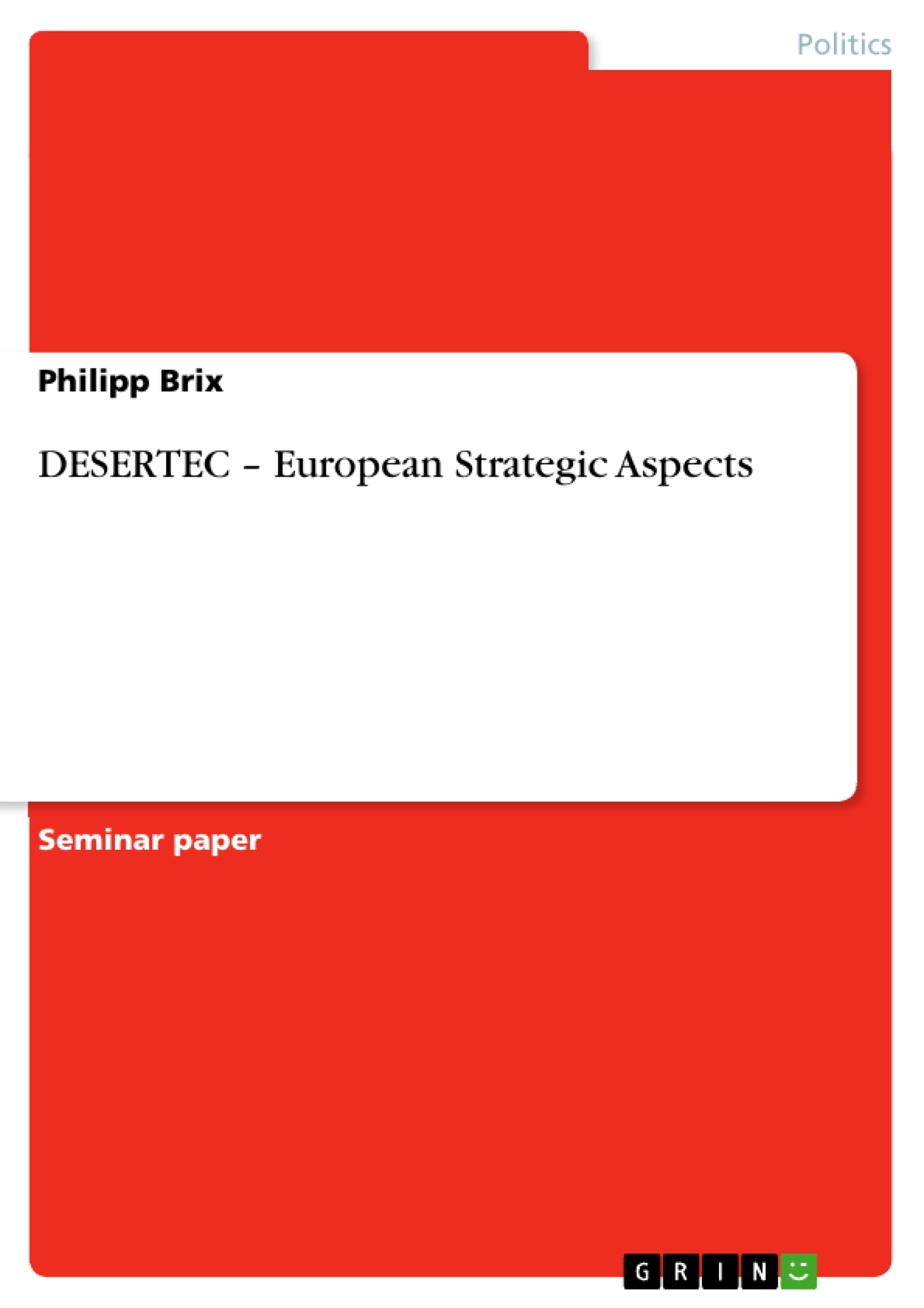Dealing with the origins of and reasons for the development of political strategies one
should not miss the opportunity to analyze the strategic dimension of the DESERTEC
project from the European perspective. Both the worldwide discussion on energy
supply and climate change as well as the urgent need for regional diplomatic and
social stability builds the fundament for DESERTEC which is a project realizing the
installation of solar power plants in the deserts of Middle East and Northern Africa
and the export of produced energy as element of the European electricity supply.
By implementing that project Europe would be able to affect three strategic problems
simultaneously: The dependency on the fossil resources oil and gas and the
countries supplying them, problems concerning the handling of climate changes as
well as the strengthening of partnerships with states of the Middle East and Northern
Africa and by that promoting regional stability.
The European Union is in need of diversification of its energy supply portfolio in order
to be prepared to fulfill international climate protection agreements and reduce the
dependencies from Russian gas and Arabian Oil. Weak partnerships with the Middle
East and Northern Africa but also problems concerning economic and social stability
within these countries bear potential to endanger the European Union by threads like
terrorism or especially refugee movements evolving out of these countries.
Inhaltsverzeichnis (Table of Contents)
- Three Problems
- Strategies and Concepts
- European Energy Strategy
- DESERTEC
- Evaluation and Reflections
- Evaluation
- Reflections
Zielsetzung und Themenschwerpunkte (Objectives and Key Themes)
The paper examines the DESERTEC project from a European strategic perspective, focusing on its potential to address key challenges related to energy supply, climate change, and regional stability. The author analyzes the project within the context of the European Union's broader energy strategy, highlighting the need for diversification and security in energy supply, particularly in light of dependencies on fossil fuels and potential instability in key energy-producing regions.
- European energy security and diversification of energy sources
- Climate change mitigation and adaptation strategies
- Regional stability in the Middle East and North Africa (MENA) region
- Strategic partnerships and international cooperation
- Technological advancements and development of renewable energy sources
Zusammenfassung der Kapitel (Chapter Summaries)
The first chapter introduces the three main strategic problems that the DESERTEC project aims to address: European dependence on fossil fuels, climate change, and regional stability in the MENA region. The second chapter provides an overview of the European Union's energy strategy as outlined in the 2006 Green Paper. It emphasizes the need for sustainability, competitiveness, and security in energy supply, highlighting the critical role of renewable energies, technological development, and strengthened partnerships with key energy-producing regions.
The second chapter also introduces the DESERTEC project and its core argumentation. Based on the White Paper published in 2007, DESERTEC aims to install solar power plants in the deserts of the MENA region and export the generated electricity to the EU, contributing significantly to European energy security and promoting sustainable development in the region.
Schlüsselwörter (Keywords)
The key concepts explored in this paper include: energy security, diversification, renewable energy, climate change, regional stability, strategic partnerships, Middle East, North Africa, European Union, DESERTEC, fossil fuels, solar power, and sustainable development.
Frequently Asked Questions
What is the DESERTEC project?
DESERTEC is a strategic project aimed at installing solar power plants in the deserts of the Middle East and North Africa (MENA) to export clean energy to Europe.
Which three strategic problems does DESERTEC address for Europe?
It addresses Europe's dependency on fossil fuels (oil and gas), the challenges of climate change, and the need for regional stability and partnerships in the MENA region.
How does DESERTEC contribute to European energy security?
By diversifying energy sources and reducing reliance on Russian gas and Arabian oil, it provides a more stable and sustainable electricity supply for the European Union.
What is the connection between energy projects and regional stability?
Large-scale investments like DESERTEC can promote economic and social stability in MENA countries, potentially reducing threats like terrorism and mass refugee movements.
What was the 2006 Green Paper's role in this strategy?
The Green Paper outlined the EU's need for a sustainable, competitive, and secure energy policy, laying the groundwork for projects focused on renewable energy and international cooperation.
- Arbeit zitieren
- Philipp Brix (Autor:in), 2009, DESERTEC – European Strategic Aspects, München, GRIN Verlag, https://www.grin.com/document/171126



